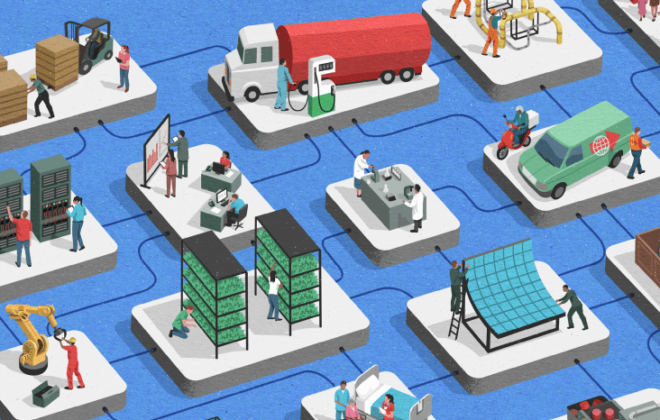Deepening Connections in a Fractured World of Work
To join us at a roundtable on this subject on Tuesday 16th May from 13:00 – 14:30, please contact scott.mills@peachymondays.com to reserve your place
Relationships are essential to our wellbeing and sense of community. They are predictors of our future mental health and some studies have found they can also be predictors of our life expectancy. Friendships have an important role in the world of work too. Data shows that having a best friend at work has positive impacts on engagement, productivity, safety and retention. And strong social connections fuel collaboration and innovation.
Research by Robin Dunbar, professor of Evolutionary Psychology at the University of Oxford into relationships and friendships, suggests that we can maintain a total of about 150 meaningful relationships at any one time.
Just like monkeys (which the research was based on), the best way to form and maintain friendships is regular (at least weekly) social, in-person interaction.
But the pandemic changed everything. We’re still in the middle of a massive experiment about where and how we work. There are attractive benefits to working from home (time, money, emissions) but as the world of work becomes increasingly virtual, it can be challenging to stay connected with colleagues. Remote work, flexible schedules, and global teams can create a sense of isolation and disconnect that can be detrimental to productivity and morale.
There are just some things that are more difficult to do in a virtual world:
- The quick catch-up in the coffee queue
- A chat about last night’s TV
- Picking up subtle cues in body language which let you know if someone is sad, stressed, angry, or disappointed.
- Those micro-actions which show kindness and thought for your colleagues (even if it’s just making them a cuppa when they’re having a hectic day)
- Casually meeting the new person on their first day at work
- Celebrating the minor and major events – special birthdays, leaving days, or promotions
- Sharing a random idea that everyone builds that could become your next product or service
- Overhearing a throw-away comment that leads to a deeper conversation.
But it’s all those little things that build relationships, build trust and allow us to rely on each other and know we’ve got each other’s back.
Without them, everything begins to feel a bit transactional.
So how do we work with what we’ve got to reconnect with each other?
1. Experiment with the Technology
Technology has made it easier than ever to stay connected with colleagues, clients, and partners. Video conferencing tools like Zoom, Teams, and Skype allow for face-to-face communication, even when individuals are physically located in different parts of the world. Collaboration tools like Slack and Microsoft Teams allow for real-time communication and document collaboration, even when team members are working at different times or from different locations.
But having a casual relationship-building conversation using those tools can feel awkward, unproductive, and weird. Why not try:
- Regular socials – we do this at Peachy Mondays every morning – 15 minutes of chat to reconnect, where work talk is banned.
- Smaller breakouts or pairs – large online meetings can be intimidating, not least because only one person can talk at a time. Some will be more than comfortable with that, but quieter voices can be drowned out and the meeting could make people feel more isolated rather than less, so encourage smaller conversations too.
- Share some prepared questions – there’s a level below the typical small talk (weather, sport, TV) where we find out what we have in common and what makes us unique. Questions like your favourite holiday destination, the last book you read, the last thing you cooked.
- Coffee Chats – randomly pair people up for 30 minutes of chat. This is a great way for new people to get to know others and to connect to the working network. It’s also a great way for leaders to stay connected.
- Connected interest groups – at a former place of work, when the first lockdown happened, we created a ‘Working from Home Alone’ group that had a weekly check-in. We did a ‘show and tell’ each week where someone would share something that was important to them.
2. Schedule Regular Check-Ins
Regular check-ins can help teams stay connected and help overcome the emotional deprivation and issues caused by isolation. Depending on the nature of the work, check-ins can be daily or weekly and can be conducted in person or virtually. These check-ins can be used to discuss progress, troubleshoot problems, and ensure that everyone is working towards the same goals.
One of the things we can miss in a virtual setting is the opportunity to help each other out – not as a task or assigned project, but just because we can see someone needs support.
You might need to use a process to perfect this – for example, asking each person to share what their ‘ask’ and ‘gift’ of the week is. For example: ‘I ask that everyone leave me alone on Tuesday so I can focus on x’ and ‘My gift is, that after Tuesday I’ll be available to support answering any queries that come in’.
3. Foster a Sense of Community
In a fragmented work environment, it can be challenging to foster a sense of community. However, organisations can take steps to create a sense of belonging and connection. This can include regular team-building events, opportunities for socialising, and recognition programs that celebrate individual and team achievements.
And it’s not just the work environment that’s fragmented – there are many opportunities where you can foster a sense of community in your communities through volunteering. Perhaps encourage colleagues who live in the same area to get together face-to-face to support a food bank or community garden. Those who are more remote can get together virtually to support online learning for similarly remote communities – the opportunities are endless.
4. Encourage Open Communication
Open communication is essential in a fragmented work environment. Team members should feel comfortable sharing their ideas, concerns, and feedback. Organisations can encourage open communication by creating a culture of transparency, providing opportunities for feedback, and actively listening to the concerns of team members.
Regular surveys or listening activities can help you do this, but sometimes just listening is the action that’s needed. Ask people how connected they feel to each other, to the goals of the business, and what could be done to retain connections.
5. Support and encourage your line managers
Post pandemic the job of the line manager has shifted again, and part of their role is to check in on the wellbeing of their team and encourage social connection (to build trust, collaboration, and accountability) beyond the annual team building day. For some line managers, who could previously ‘eyeball’ their whole team, this is going to be a new set of skills and they will need upskilling and support to carry out that role.
In conclusion, deepening connections in a fractured world of work requires a more deliberate effort and more devoted time. Through a combination of technology, communication, community-building, and management strategies you can restore and maintain colleague relationships to create a sense of belonging and connection that can help foster productivity, creativity, and overall wellbeing.
Listen better. Act faster. Drive engagement & effectiveness.
To find out more about the benefits of Peachy Mondays for your organisation please get in touch today.
To join us at a roundtable on this subject on Tuesday 16th May from 13:00 – 14:30, please contact scott.mills@peachymondays.com to reserve your place
If you’ve found this article helpful, please sign up to our newsletter to stay informed of the latest insights from Peachy Mondays.
Related Posts
Categories
- Case Study (13)
- Change and transformation (21)
- Connectedness (4)
- Culture (17)
- Design (10)
- Diversity and Inclusion (1)
- Effectiveness (16)
- Employee engagement (60)
- Employee experience (43)
- Employee Feedback (51)
- Employee Wellbeing (1)
- Events (10)
- Financial Wellbeing (1)
- Happiness (4)
- Internal Communications (10)
- News (24)
- Onboarding (1)
- Organisational Effectiveness (18)
- Uncategorized (3)




